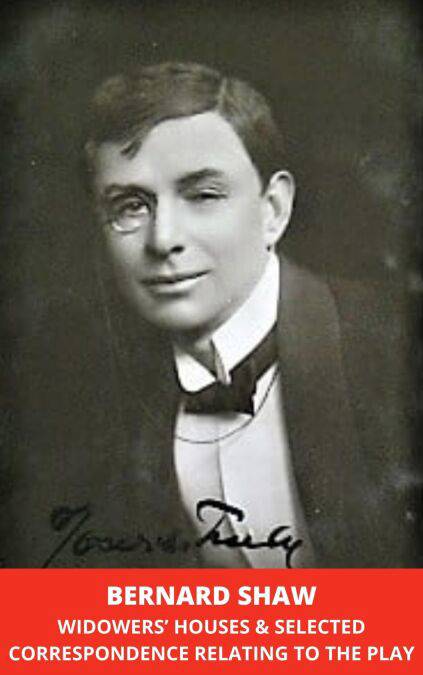
Bedankt voor het vertrouwen het afgelopen jaar! Om jou te bedanken bieden we GRATIS verzending (in België) aan op alles gedurende de hele maand januari.
- Afhalen na 1 uur in een winkel met voorraad
- In januari gratis thuislevering in België
- Ruim aanbod met 7 miljoen producten
Bedankt voor het vertrouwen het afgelopen jaar! Om jou te bedanken bieden we GRATIS verzending (in België) aan op alles gedurende de hele maand januari.
- Afhalen na 1 uur in een winkel met voorraad
- In januari gratis thuislevering in België
- Ruim aanbod met 7 miljoen producten
Zoeken
€ 6,99
+ 6 punten
Omschrijving
The selected correspondence of Bernard Shaw relating to the play Widowers' Houses contains 160 letters and entries written between 1885 and 1933.
This publication from a revised edition Plays: Pleasant and Unpleasant. The First Volume, Contain-ing the Three Unpleasant Plays (Widowers' Houses, The Philandered, & Mrs Warren's Profession) published by Constable and Company Ltd, London 1919 is a handmade reproduction from the original edition, and remains as true to the original work as possible. The original edition was processed manually by means of a classic editing which ensures the quality of publications and the unrestricted enjoyment of reading.
Here are some inspirational book quotes from Bernard Shaw: 'I do not hesitate to say that many of my critics have been completely beaten by the play simply because they are ignorant of society.' 'Now, the didactic object of my play is to produce conviction of sin, to make the Pharisee who repudiates Sartorius as either a Harpagon [a character of a comedy The Miser by the French playwright Molière] or a diseased dream of mine, and thanks God that such persons do not represent his class, recognize that Sartorius is his own photograph.' 'These gentlemen believe that, according to me, what is wrong with society is that the rich, who are all wicked, oppress the poor, who are all virtuous. I will not waste the space of The Star by dealing with such a misconception further than to curtly but goodhumoredly inform those who entertain it that they are fools.' 'Unfortunately I have no power of producing beauty: my genius is the genius of intellect, and my farce its derisive brutality.'
This publication from a revised edition Plays: Pleasant and Unpleasant. The First Volume, Contain-ing the Three Unpleasant Plays (Widowers' Houses, The Philandered, & Mrs Warren's Profession) published by Constable and Company Ltd, London 1919 is a handmade reproduction from the original edition, and remains as true to the original work as possible. The original edition was processed manually by means of a classic editing which ensures the quality of publications and the unrestricted enjoyment of reading.
Here are some inspirational book quotes from Bernard Shaw: 'I do not hesitate to say that many of my critics have been completely beaten by the play simply because they are ignorant of society.' 'Now, the didactic object of my play is to produce conviction of sin, to make the Pharisee who repudiates Sartorius as either a Harpagon [a character of a comedy The Miser by the French playwright Molière] or a diseased dream of mine, and thanks God that such persons do not represent his class, recognize that Sartorius is his own photograph.' 'These gentlemen believe that, according to me, what is wrong with society is that the rich, who are all wicked, oppress the poor, who are all virtuous. I will not waste the space of The Star by dealing with such a misconception further than to curtly but goodhumoredly inform those who entertain it that they are fools.' 'Unfortunately I have no power of producing beauty: my genius is the genius of intellect, and my farce its derisive brutality.'
Specificaties
Betrokkenen
- Auteur(s):
- Uitgeverij:
Inhoud
- Aantal bladzijden:
- 448
- Taal:
- Duits
Eigenschappen
- Productcode (EAN):
- 9783754174388
- Verschijningsdatum:
- 27/10/2021
- Uitvoering:
- E-book
- Beveiligd met:
- Digital watermarking
- Formaat:
- ePub

Alleen bij Standaard Boekhandel
+ 6 punten op je klantenkaart van Standaard Boekhandel
Beoordelingen
We publiceren alleen reviews die voldoen aan de voorwaarden voor reviews. Bekijk onze voorwaarden voor reviews.









